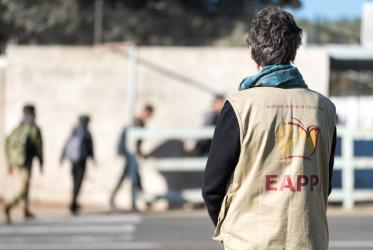Nine volunteers with the WCC's Ecumenical Accompaniment Programme in Palestine and Israel have met with European Union officials, urging them to honour recently issued guidelines on grants and loans to Israeli settlements.
Their discussions particularly focused on Israeli settlements, which are growing at a rapid rate, making solutions for peace and stability in the region more difficult.
The ecumenical accompaniers (EAs), who lived in the West Bank and East Jerusalem as part of the EAPPI programme, brought information from the ground to the officials, alerting them to the urgency of the situation.
The group of former ecumenical accompaniers was comprised of participants from Poland, Germany, the UK, Ireland, Sweden, the Netherlands and Finland. Together with staff from the EAPPI, they participated in a series of meetings from 23 to 26 September in Brussels, Belgium.
Their visit also coincided with the World Week for Peace in Palestine and Israel.
The EAs met with more than 60 officials, mainly parliamentarians (MEPs) from a wide spectrum of political affiliations, as well as permanent representatives to the EU from Poland, the UK, Germany, the Netherlands, Austria, Italy, Ireland, Cyprus, Denmark, Portugal and Sweden. They had meetings with political advisors to the EU Parliament and civil servants working in the EU External Action Service, the office of EU foreign minister Catherine Ashton and the EU Commission on Research.
The EAs stated that despite the fact that the EU has always been clear on condemning settlements and has never recognized Israel’s sovereignty on territory occupied since 1967, it has, nevertheless, been giving research grants to companies such as Ahava, who operate largely in the West Bank.
The EU is also a major market for agricultural products from the settlements and therefore helps the settlements to be viable and even profitable.
The EU has recently issued guidelines on grants and loans to the settlements, which is a first step towards making sure the settlements are not benefitting from trade with the EU. These steps will help the EU’s actions to be more in line with their policy. However, after the guidelines were issued in July, the EU faced harsh criticism mainly from the Israeli government.
In addition to asking officials to make sure those guidelines will be implemented fully and on time, the EAs also requested that two EU-wide guidelines that are currently in the pipeline be finalized without delay. One is on the proper labeling of products from the settlements and the other on EU businesses and companies involved in the settlements. They stressed that it is an important measure to make sure that consumer rights are protected and that businesses are properly advised on how to avoid involvement with violations of international law.
“The officials we met were very receptive to our recommendations and found them reasonable,” said Anne-Marie Vuignier, staff member of the EAPPI. She went on to say that “some of the officials were really thankful to us for our principled impartiality as they usually get to meet people who are very extreme, especially on these issues.”
“Many of them expressed interest in getting more information from the field, such as compilations of incident reports,” shared Vuignier.
The EAs included Dominika Blachnika, Johnathan Adams, Jenny Derbyshire, Anna-Maria Laurell, Geert Horstmann, Teresa Mayr, Beatrice Banafa, Wolfgang Sréter and Ekkerhart Drost.
More information on Ecumenical Accompaniment Programme in Palestine and Israel









